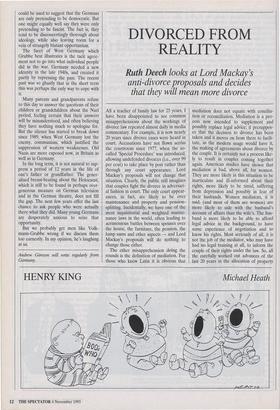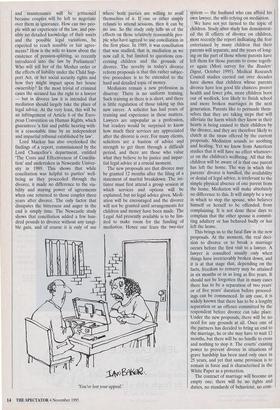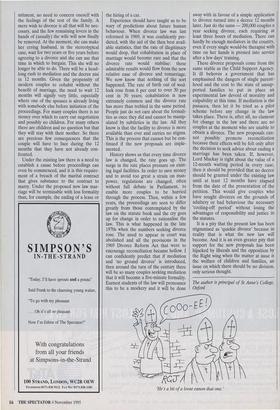DIVORCED FROM REALITY
Ruth Deech looks at Lord Mackay's
anti-divorce proposals and decides that they will mean more divorce
AS a teacher of family law for 25 years, I have been disappointed to see common misapprehensions about the workings of divorce law repeated almost daily in media commentary. For example, it is now nearly 20 years since divorce cases were heard in court. Accusations have not flown across the courtroom since 1977, when the so- called 'Special Procedure' was introduced, allowing undefended divorces (i.e., over 99 per cent) to take place by post rather than through any court appearance. Lord Mackay's proposals will not change that situation. Clearly, the public still imagines that couples fight the divorce in adversari- al fashion in court. The only court appear- ances, in fact, are likely to be over maintenance and property and pension- splitting. Incidentally, we have one of the most inquisitorial and weighted mainte- nance laws in the world, often leading to acrimonious battles between spouses over the house, the furniture, the pension, the lump sums and other aspects — and Lord Mackay's proposals will do nothing to change those either.
The other misapprehension doing the rounds is the definition of mediation. For those who know Latin it is obvious that mediation does not equate with concilia- tion or reconciliation. Mediation is a pro- cess now intended to supplement and possibly replace legal advice; it presuppos- es that the decision to divorce has been taken and it moves on from there to facili- tate, as the modern usage would have it, the making of agreements about divorce by the couple. It is certainly not a process like- ly to result in couples coming together again. American studies have shown that mediation is bad, above all, for women. They are more likely in this situation to be inarticulate and ill-informed about their rights, more likely to be timid, suffering from depression and possibly in fear of their husbands. Women mediators, it is said, (and most of them are women) are more likely to side with the husband's account of affairs than the wife's. The hus- band is more likely to be able to afford legal advice in the background, to have some experience of negotiation and to know his rights. Most seriously of all, it is not the job of the mediator, who may have had no legal training at all, to inform the couple of their rights under the law. So, all the carefully worked out advances of the last 20 years in the allocation of property and maintenance will be jettisoned because couples will be left to negotiate over them in ignorance. How can two peo- ple with no experience of the law, and pos- sibly no detailed knowledge of their assets and the possible legal variations, be expected to reach sensible or fair agree- ments? How is the wife to know about the existence of pension-splitting, so recently introduced into the law by Parliament? Who will tell her of the Mesher order or the effects of liability under the Child Sup- port Act, or her social security rights and how they might impact upon her house ownership? In the most trivial of criminal cases the accused has the right to a lawyer — but in divorce law it is intended that mediation should largely take the place of legal advice. At the very least, this will be an infringement of Article 6 of the Euro- pean Convention on Human Rights, which guarantees 'a fair and public hearing with- in a reasonable time by an independent and impartial tribunal established by law'.
Lord Mackay has also overlooked the findings of a report, commissioned by the Lord Chancellor's department, entitled `The Costs and Effectiveness of Concilia- tion' and undertaken in Newcastle Univer- sity in 1989. This shows that while conciliation was helpful to parties' well- being as they proceeded through the divorce, it made no difference to the via- bility and staying power of agreements when one returned to those couples three years after divorce. The only factor that dissipates the bitterness and anger in the end is simply time. The Newcastle study shows that conciliation added a few hun- dred pounds to divorce without any tangi- ble gain, and of course it is only of use where both parties are willing to avail themselves of it. If one or other simply refuses to attend sessions, then it can be no use. So the study only tells us of the effects on those relatively reasonable peo- ple who have agreed to use conciliation in the first place. In 1989, it was conciliation that was studied, that is, mediation as we now call it, but limited to questions con- cerning children and the grounds of divorce. The novelty in today's divorce reform proposals is that this rather subjec- tive procedure is to be extended to the hard and detailed topic of money.
Mediators remain a new profession in disarray. There is no uniform training. Such training as there is is short, and there is little regulation of those taking up this new career. A solicitor has had years of training and experience in these matters. Lawyers are unpopular as a profession, but readers would be surprised to know how much their services are appreciated after the divorce is over. For many clients, solicitors are a bastion of advice and strength to get them through a difficult period, and there are those who value what they believe to be justice and impar- tial legal advice at a crucial moment.
The new proposals are that divorce may be granted 12 months after the filing of a statement of marital breakdown. The ini- tiator must first attend a group session at which services and options will be explained, but no legal advice given. Medi- ation will be encouraged and the divorce will not be granted until arrangements for children and money have been made. The Legal Aid presently available is to be lim- ited to make room for the funding of mediation. Hence one fears the two-tier `You've lost your appeal.' system — the husband who can afford his own lawyer, the wife relying on mediation.
We have not yet turned to the topic of children. Study after study has demonstrat- ed the ill effects of divorce on children, most recently the report indicating the fear entertained by many children that their parents will separate, and the years of long- ing on the part of those whose parents have left them for those parents to come togeth- er again (Mori survey for the Readers' Digest, October 1995). Medical Research Council studies carried out over decades have shown that children whose parents divorce have less good life chances: poorer health and fewer jobs, more children born out of wedlock, less likely to finish school and more broken marriages in the next generation. Parents like to persuade them- selves that they are taking steps that will alleviate the harm which they know in their hearts is being caused to their children by the divorce, and they are therefore likely to clutch at the straw offered by the current proposals. Mediation sounds so soothing and healing. Yet we know from American studies that it will have no effect whatsoev- er on the children's wellbeing. All that the children will be aware of is that one parent has left the home. The way in which the parents' divorce is handled, the availability or denial of legal advice, is irrelevant to the simple physical absence of one parent from the home. Mediation will make absolutely no difference to this. It will simply be a way in which to stop the spouse, who believes himself or herself to be offended, from complaining. It is not done these days to complain that the other spouse is commit- ting adultery or has behaved badly or has left the home.
This brings us to the fatal flaw in the new proposals. At the moment, the real deci- sion to divorce or to break a marriage occurs before the first visit to a lawyer. A lawyer is consulted usually only when things have irretrievably broken down, and it is at that stage that, depending on the facts, freedom to remarry may be attained in six months or in as long as five years. It should not be forgotten that in many cases there has to be a separation of two years' or of five years' duration before proceed- ings can be commenced. In any case, it is widely known that there has to be a lengthy separation or an offence committed by the respondent before divorce can take place. Under the new proposals, there will be no need for any grounds at all. Once one of the partners has decided to bring an end to the marriage, he or she may have to wait 12 months, but there will be no hurdle to cross and nothing to stop it. The courts' existing power to prevent divorce in situations of grave hardship has been used only once in 25 years, and yet that same provision is to remain in force and is characterised in the White Paper as a protection.
The contract of marriage will become an empty one; there will be no rights and duties, no standards of behaviour, no com- mitment, no need to concern oneself with the feelings of the rest of the family. A mere wish to divorce is all that will be nec- essary, and the few remaining levers in the hands of (usually) the wife will now finally be removed. At the moment, she can make her erring husband, in the stereotypical case, wait for two years or five years before agreeing to a divorce and she can use that time in which to bargain. This she will no longer be able to do. There will be a head- long rush to mediation and the decree nisi in 12 months. Given the propensity of modem couples to cohabit without the benefit of marriage, the need to wait 12 months will signify very little, especially where one of the spouses is already living with somebody else before initiation of the proceedings. For many couples there is no money over which to carry out negotiation and possibly no children. For many others there are children and no question but that they will stay with their mother. So there are precious few consequences that the couple will have to face during the 12 months that they have not already con- fronted.
Under the existing law there is a need to establish a cause before proceedings can even be commenced, and it is this require- ment of a breach of the marital contract that gives substance to the contract to marry. Under the proposed new law mar- riage will be terminable with less formality than, for example, the ending of a lease or the hiring of a car.
Experience should have taught us to be wary of predictions about future human behaviour. When divorce law was last reformed in 1969, it was confidently pre- dicted, with the aid of the then best avail- able statistics, that the rate of illegitimacy would drop, that cohabitation in place of marriage would become rare and that the divorce rate would stabilise: these admirable results would flow from the new relative ease of divorce and remarriage. We now know that nothing of the sort happened. The rate of birth out of wed- lock rose from 6 per cent to over 30 per cent in 30 years; cohabitation is now extremely common and the divorce rate has more than trebled in the same period. People just do not care about the formali- ties as once they did and cannot be manip- ulated by subtleties in the law. All they know is that the facility to divorce is more available than ever and carries no stigma. This is the process that cannot but be con- tinued if the new proposals are imple- mented.
History shows us that every time divorce law is changed, the rate goes up. The surge in the rate places pressure on exist- ing legal facilities. In order to save money and to avoid too great a strain on man- power, regulations are changed, often without full debate in Parliament, to enable more couples to be hurried through the process. Then, within a few years, the proceedings are seen to differ greatly from those contemplated by the law on the statute book and the cry goes up for change in order to rationalise the law. This is what happened in the late 1970s when the numbers seeking divorce rose. The need to appear in court was abolished and all the provisions in the 1969 Divorce Reform Act that were to encourage reconciliation became hollow. I can confidently predict that if mediation and 'no ground divorce' is introduced, then around the turn of the century there will be so many couples seeking mediation that it will become a five-minute formality. Earnest students of the law will pronounce this to be a mockery and it will be done away with in favour of a simple application to divorce turned into a decree 12 months later. Just do the sums — 200,000 couples a year seeking divorce, each requiring at least three hours of mediation. There can hardly be enough mediators in the country, even if every single would-be therapist with time on her hands is pressed into service after a few days' training.
These divorce proposals come from the same stable as the Child Support Agency. It ill behoves a government that has emphasised the dangers of single parent- hood and the cost to the state of unsup- ported families to put in place an experimental law devoid of morality and culpability at this time. If mediation is the panacea, then let it be tried as a pilot scheme before any change in the law takes place. There is, after all, no clamour for change in the law and there are no couples at the moment who are unable to obtain a divorce. The new proposals can- not possibly promote reconciliation because their effects will be felt only after the decision to seek advice about ending a marriage has been taken. If, however, Lord Mackay is right about the value of a 12-month waiting period in every case, then it should be provided that no decree should be granted under the existing law until at least 12 months have elapsed from the date of the presentation of the petition. This would give couples who have sought divorces on the grounds of adultery or bad behaviour the necessary `cooling-off period' without losing the advantages of responsibility and justice in the statutes.
It is a pity that the present law has been stigmatised as 'quickie divorce' because in reality that is what the new law will become. And it is an even greater pity that support for the new proposals has been hijacked by liberals and the opposition by the Right wing when the matter at issue is the welfare of children and families, an issue on which there should be no division, only serious thought.
The author is principal of St Anne's College, Oxford He's a bit of a loose canon that one.'












































































 Previous page
Previous page